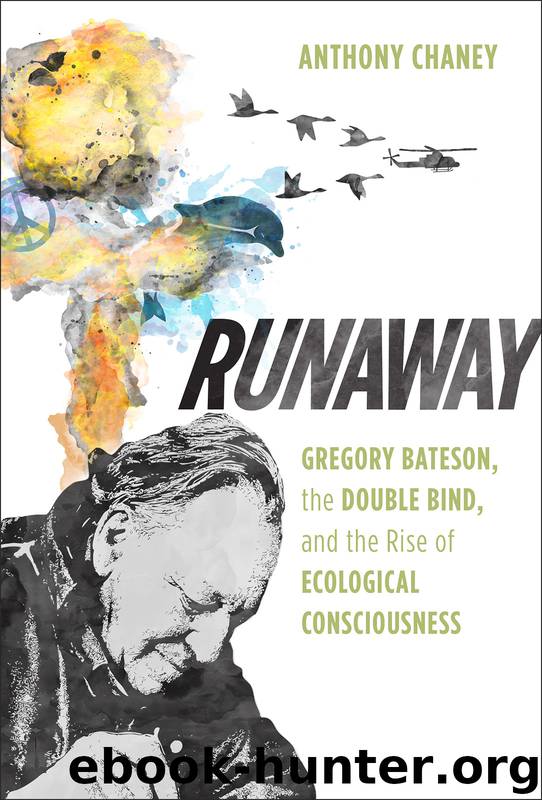Runaway by Anthony Chaney

Author:Anthony Chaney [Chaney, Anthony]
Language: eng
Format: epub
Publisher: University of North Carolina Press
Published: 2017-01-15T05:00:00+00:00
CYBERNETICS: A DIM HOPE
When an individual’s past experience is examined to provide an explanation for that individual’s mental pathology, that is a psychiatric diagnosis. When the same approach is applied not to an individual but to a class of individuals, the diagnosis merges with historical interpretation. As historical interpretations go, the one Bateson offered in “From Versailles to Cybernetics” is idiosyncratic and thin. It is by no means outrageous to see the seeds of World War II in the Treaty of Versailles, the Cold War in World War II’s endgame, and the U.S. debacle in Vietnam as the result of too rigid a Cold War mentality. To press Bateson too hard, however, on the sophistication of his historical interpretation is to mistake his purpose.
In “From Versailles to Cybernetics,” the historical events surrounding the Treaty of Versailles served Bateson as a vehicle, a central metaphor. The metaphor allowed him to speak, in a nontechnical way, directly to the concerns of his audience and to offer them a kind of insight-based therapy. It was the sort of therapy he was used to offering, the kind he had always offered students and patients alike: he sought to engage them with the concerns of his own scientific inquiry as a way of showing that their problems and his concerns converged on some centrality of ideas. These ideas interacted analogously. Homeostatic systems, μ-function, logical types, and the double bind—Bateson held these notions up to situations of vastly different scale, from the quantum, to the personal, to the societal, to the environmental. The gesture was holistic: as above, so below.
Implicit in this holism was the merger of fact and value, manifesting itself in Bateson’s insistence that descriptions of reality and ethical matters were reflexive. The discoveries and refinements of the Macy Conferences, as a new body of scientific fundamentals, had made the difference here. Bateson termed these discoveries “cybernetics,” again for rhetorical purposes. It was a term he thought his audience knew. But the name was not as important as the change in attitude. Because of the new fundamentals of cybernetics, “ethics can now be looked at with formality, rigor, logic, mathematics, and all that,” Bateson claimed. Ethics now stood “on a different sort of basis from mere invocational preachments. We do not have to feel our way; we can sometimes know right from wrong.”42
The new knowledge and orientation made possible by cybernetics didn’t merely mean an attitudinal change, as that change brought about by the Treaty of Versailles. It was, Bateson said, “a change in the understanding of what an attitude is.” This was a change at a different level of abstraction, and so, for Bateson, vastly more significant. It gave him “at least a dim hope that we can bring ourselves to use this new understanding with some honesty. If we understand a little bit of what we’re doing, maybe it will help us to find our way out of the maze of hallucinations that we have created around ourselves.”43
The ideas themselves were not where the hope lay.
Download
This site does not store any files on its server. We only index and link to content provided by other sites. Please contact the content providers to delete copyright contents if any and email us, we'll remove relevant links or contents immediately.
| Administration & Medicine Economics | Allied Health Professions |
| Basic Sciences | Dentistry |
| History | Medical Informatics |
| Medicine | Nursing |
| Pharmacology | Psychology |
| Research | Veterinary Medicine |
Periodization Training for Sports by Tudor Bompa(8240)
Why We Sleep: Unlocking the Power of Sleep and Dreams by Matthew Walker(6688)
Paper Towns by Green John(5168)
The Immortal Life of Henrietta Lacks by Rebecca Skloot(4569)
The Sports Rules Book by Human Kinetics(4374)
Dynamic Alignment Through Imagery by Eric Franklin(4201)
ACSM's Complete Guide to Fitness & Health by ACSM(4044)
Kaplan MCAT Organic Chemistry Review: Created for MCAT 2015 (Kaplan Test Prep) by Kaplan(3994)
Livewired by David Eagleman(3757)
Introduction to Kinesiology by Shirl J. Hoffman(3755)
The Death of the Heart by Elizabeth Bowen(3599)
The River of Consciousness by Oliver Sacks(3590)
Alchemy and Alchemists by C. J. S. Thompson(3506)
Bad Pharma by Ben Goldacre(3415)
Descartes' Error by Antonio Damasio(3264)
The Emperor of All Maladies: A Biography of Cancer by Siddhartha Mukherjee(3135)
The Gene: An Intimate History by Siddhartha Mukherjee(3087)
The Fate of Rome: Climate, Disease, and the End of an Empire (The Princeton History of the Ancient World) by Kyle Harper(3051)
Kaplan MCAT Behavioral Sciences Review: Created for MCAT 2015 (Kaplan Test Prep) by Kaplan(2974)
